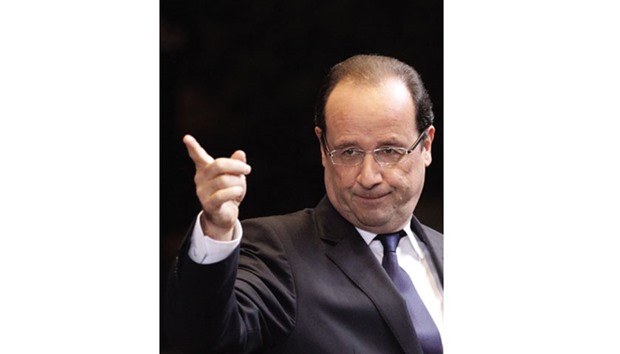French President Francois Hollande has scrapped contested constitutional reforms he proposed after the Paris attacks, in an embarrassing U-turn for his already beleaguered government.
The reforms included a plan to strip convicted terrorists of their French nationality, which had sparked a fierce debate over the risk that it would create stateless persons.
Hollande also wanted to enshrine in the constitution a state of emergency adopted after suicide bombers and gunmen from the Islamic State group killed 130 people on November 13.
However the lower house National Assembly and opposition-dominated Senate failed to agree on the exact wording of the text, a prerequisite for a constitutional amendment to be adopted in France.
“A compromise appears out of reach on the stripping of terrorists’ nationality,” Hollande said.
“I also note that a section of the opposition is hostile to any constitutional revision. I deeply regret this attitude,” the president said in a brief televised statement. “I have decided to close the constitutional debate (but) I will not deviate from the commitments I have taken ... to ensure the security of our country.”
Initially Hollande had proposed stripping citizenship from convicted Islamic militants born in France who held a second passport.
But this sparked howls of protest from within his Socialist party, with critics arguing that it would create two categories of French citizens – a sensitive issue in a country where millions hold two passports.
Polls showed the majority of terror-weary French people supported the plan, but justice minister Christiane Taubira was so opposed to the measure that she resigned.
The right and far-right initially praised the measure, until the government amended it to remove any mention of dual nationality.
This sparked criticism over the potential creation of stateless citizens.
Hollande’s move to drop the reform comes as authorities in Europe face increasing criticism over laxity and security failings in the face of the growing Islamic militant threat.
Links have emerged between the Islamic State (IS) cell which attacked Paris and the suicide bombers who struck Brussels last week, killing 32 people.
“The threat remains higher than ever,” said Hollande.
The failure to convince all political parties to fall behind the reforms will deal a stinging blow to Hollande, who is hoping to run for re-election next year.
An Ipsos-Sopra Steria poll published yesterday showed that Hollande would be eliminated in the first round of an election if held now, no matter who his opponent.
Prime Minister Manuel Valls said he “bitterly regrets” that the right refused an “outstretched hand”.
The leader of the far-right National Front (FN) Marine Le Pen said Hollande’s decision to scrap the constitutional reform was “a historical failure” and called for him to resign.
However, Hollande’s Socialist party said the opposition was responsible for the “sad spectacle”.
“We apologise to the French people. We were not able to convince the right in general ... to reinforce our law in the fight against terrorism,” said party leader Jean-Christophe Cambadelis.
Hollande was France’s most unpopular leader in modern history when Paris suffered its first terrorist attack of 2015, when gunmen killed 17 people at the offices of Charlie Hebdo magazine and at a Jewish supermarket in January.
His popularity briefly rose over his handling of those attacks, but not for long.
The display of political unity quickly fizzled out after the November attacks, and turned to blame-trading and infighting among Socialists who accused Hollande of shifting to the right with his hardline response.
Hollande has also faced a series of street protests, first over economic reforms which Prime Minister Manuel Valls had to force through parliament, and now over plans to reform labour laws.

Hollande: A compromise appears out of reach on the stripping of terrorists’ nationality ... I also note that a section of the opposition is hostile to any constitutional revision. I deeply regret this attitude.
